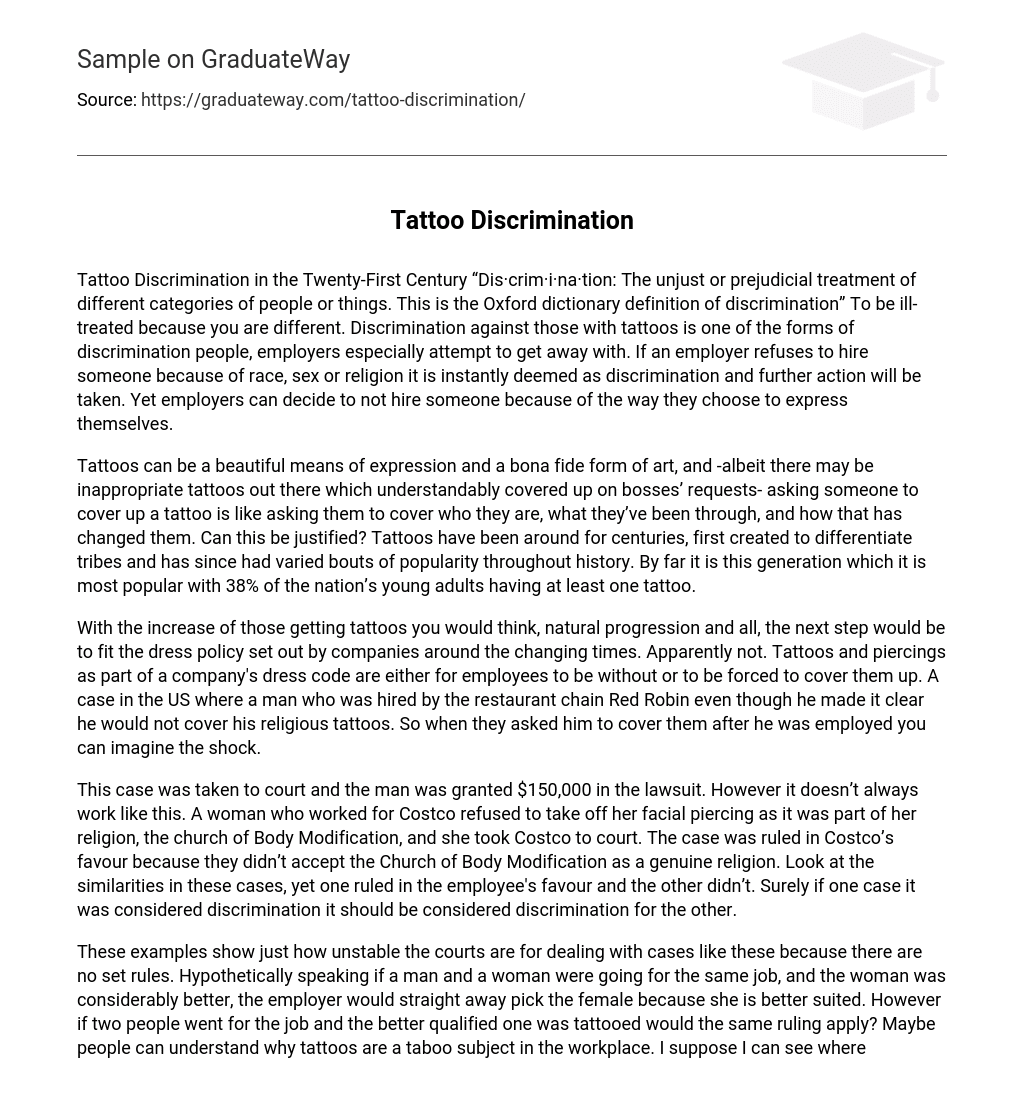Tattoo discrimination in the modern era is an unjust treatment that individuals with tattoos frequently encounter. According to the Oxford dictionary’s definition of discrimination, it involves prejudiced behavior based on various factors such as race, sex, or religion. This particular form of prejudice is often observed among employers who aim to avoid other types of discrimination. Although refusing employment due to one’s chosen self-expression may not be immediately categorized as discrimination like other factors, it remains a prevalent issue in our present society.
Tattoos serve as a beautiful means of expression and a genuine form of art. While there may be inappropriate tattoos that bosses understandably request to be covered, asking someone to hide their tattoos is essentially asking them to hide their identity, experiences, and personal transformation. Can this request be justified? Tattoos have existed for centuries, initially used to distinguish tribes and have since experienced fluctuating popularity throughout history. The current generation embraces tattoos the most, with 38% of the nation’s young adults having at least one tattoo.
Despite the rising trend of tattoos, company dress codes have not kept pace. Numerous companies still enforce policies that mandate employees to conceal or abstain from having tattoos and piercings. A recent incident in the US involving an individual employed by Red Robin, a restaurant chain, serves as an illustration of this issue. Despite initially expressing his intention to display his religious tattoos, he was unexpectedly instructed to cover them up after commencing work.
The court granted a man $150,000 in damages in a lawsuit, but results may differ. In another legal dispute, a woman practicing the religion of Body Modification declined to remove her facial piercing while employed at Costco. She sued the company but was unsuccessful as Costco did not recognize the Church of Body Modification as a legitimate faith. Despite similarities between these cases, one favored the employee while the other did not. If one case was found to be discriminatory, both should be considered instances of discrimination.
The examples demonstrate the instability within the courts regarding cases that lack established rules. For example, if a man and woman were vying for a job and the woman possessed significantly greater qualifications, it is probable that the employer would select her based on her suitability. Nevertheless, what if both candidates were equally qualified but one had visible tattoos? Would the same preference be granted? The workplace deems tattoos as taboo, which can be comprehensible considering certain reasons. However, there are situations beyond work where these conventions do not hold true.
Joel Madden, the lead singer of punk pop band Good Charlotte, was asked to cover his heavily tattooed arms when boarding a British Airways flight. Madden expressed his frustration on Twitter, claiming that this was discrimination as none of his tattoos were offensive. In response, British Airways released a statement stating that they did not have a specific policy regarding tattoos and that the employee responsible for the request would be disciplined.
The lead singer of Good Charlotte has not received an apology for an incident that highlights unfair bias towards a paying customer on a flight. Despite having paid for their seat like everyone else, the frontman was forced to hide their tattoos because of one person’s objection. This is not an isolated occurrence, as many paying customers in Melbourne, Australia are being denied entry to bars solely based on their visible tattoos without any valid reason.
The prohibition of tattoos has been seen as a violation of human rights because it prevents people from expressing their individuality. This problem is not only found in certain countries, but also occurs in American bars, which is confusing. It is hard to understand why bars often turn away customers with tattoos. While it is understandable that bars may not want to encourage tattoo self-expression, it seems contradictory for them to have policies banning tattooed individuals or taking a profit-focused perspective that ignores the potential spending power of these customers.
There is a growing trend among bars to deny service to people with many tattoos, which raises the issue of why this isn’t considered discrimination. On a brighter note, a worried mother criticizes the appearance of Tattooed Barbie and worries about its impact on her daughter, although she uses harsher language. This demonstrates ignorance and bias. It’s important to mention that Tattooed Barbie is actually meant for collectors and not intended as a toy for children.
Barbie’s tattoo on her shoulder is tasteful and not provocative. Some people may argue that she is just a plastic doll and not a real person. It is interesting how parents are fine with buying their kids a doll that has unrealistic body proportions (36-18-38), but when she has a tattoo, suddenly there is outrage. People believe that promoting tattoos as cool is inappropriate, comparing it to encouraging smoking and drinking. This exemplifies the general perception of tattoos as associated with trouble or criminal behavior and the idea that people should avoid those with tattoos. However, this stereotype is outdated. It no longer holds true and society should move forward to accepting tattoos for what they are: a form of self-expression and individuality. People should not be judged or made to suffer because they choose to have tattoos.
I believe that discrimination based on tattoos should be treated equally to sexism or racism. Hopefully, as tattoos become more common and accepted, societal views will change with the establishment of clear guidelines for body art. However, until that happens, individuals who boldly express themselves through tattoos will continue to face judgment. This leaves a negative impression on me.
[source: Tracey Matheson Bibliography]





